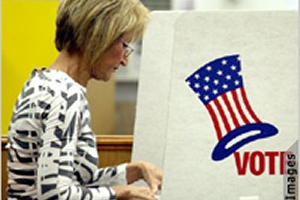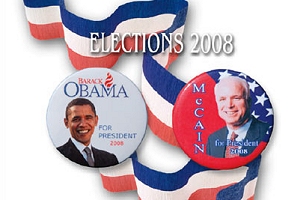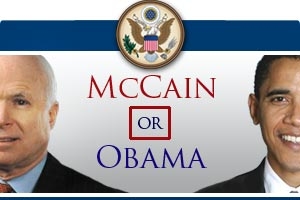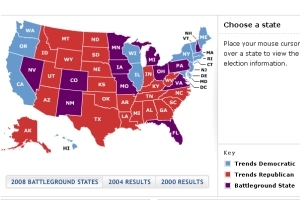America in context
U.S. Democracy Has Come a Long Way

America's Founding Fathers would be "astounded" to see the presidential race of 2008, James Glassman, under secretary of state for public diplomacy and public affairs, said October 27.
“But I believe, as well, that they would be very proud,” of the political developments, Glassman told a group of participants in the International Visitors Observe the Elections (I-Vote) program.
As part of his duties, Glassman oversees the State Department’s international exchange programs. In this position, Glassman said he has learned how closely people around the world are following the 2008 election.
The 100 visitors from across the globe participating in the I-Vote program, an initiative sponsored by the Department of State’s Bureau of Educational and Cultural Affairs, will get a close view of the political action. In the days leading up to and including Election Day, the participants will observe the political activity in some of the country’s most competitive swing states, including Missouri, Colorado and Ohio.
“As our country prepares to elect the 44th president of the United States, members of Congress and thousands of officials in state and local contests, you will witness history in the making,” Glassman told the participants. “You will have the opportunity to observe democracy in action as Americans’ exercise their rights.”
“You will see firsthand the American political process that has endured the test of time since it was first imagined by Benjamin Franklin and the Founding Fathers in 1787.”
“Americans from coast to coast, young and old, are energized about this election in a way that we have not seen in recent memory,” Glassman said. “This is why I’m so pleased we can share this important moment in our history with all of you.”
AMERICAN DEMOCRACY “NOT PERFECT”
Glassman said the path of democracy in the United States has “not been a particularly easy one,” but that the 2008 election reminds people the country has “come a long way.”
The under secretary said the framers of the Constitution opted to not address the issue of slavery. This decision was one that contributed to the Civil War and decades of struggles for African Americans to receive full liberties. Women also faced a long struggle for the right to vote.
“Just imagine the significance of what we are experiencing as Americans today,” Glassman said. “Whatever the outcome on November 4 … be it a Republican or Democratic victory, our country will be electing either its first African-American president or its first woman as vice president.”
“The true genius of our founders was not that they set up a perfect system of governance, but that they embraced and institutionalized the great self-correcting mechanisms of democracy,” Glassman said.
“Democracy is not easy, democracy is never perfect. We’re absolutely not perfect in the United States, nor do we believe that our system is right for everyone. What we believe is that free people with free choices devise the best systems.”
By Michelle Austein
Staff Writer
Recently on America in context
The Candidates
 Every presidential campaign is dramatic and historic, but as the fervor surrounding the 2008 election continues to build, U.S. voters and the rest of the world will want to consider the candidates' personal histories more closely. What sort of people rise to the top in the U.S. political system, what are their attributes, their sensibilities, and their strengths?
Every presidential campaign is dramatic and historic, but as the fervor surrounding the 2008 election continues to build, U.S. voters and the rest of the world will want to consider the candidates' personal histories more closely. What sort of people rise to the top in the U.S. political system, what are their attributes, their sensibilities, and their strengths?
Large Audiences Expected for Televised Presidential Debates
 McCain, Obama will participate in three debates, beginning September 26. Polls show the presidential contest between John McCain and Barack Obama is extremely close, but upcoming debates could change that, political experts say.
McCain, Obama will participate in three debates, beginning September 26. Polls show the presidential contest between John McCain and Barack Obama is extremely close, but upcoming debates could change that, political experts say.
With Conventions Concluded, U.S. General Election Campaign Begins
 With the national political party conventions behind them, presidential candidates John McCain and Barack Obama are focusing their efforts on winning undecided voters in battleground states.
With the national political party conventions behind them, presidential candidates John McCain and Barack Obama are focusing their efforts on winning undecided voters in battleground states.